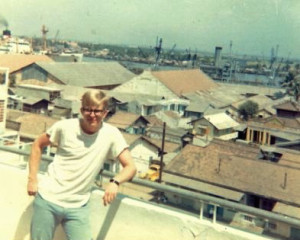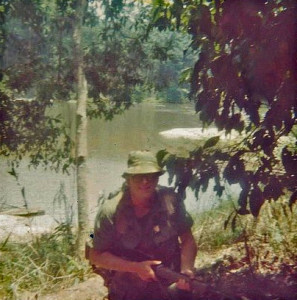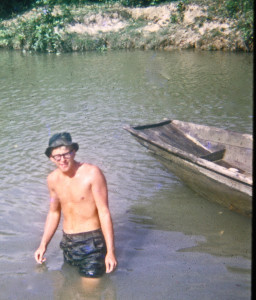Bud Domagata – Forward Observer – Part Two
Vietnam #1
I went to college for a year and a half, and I hated it, mostly because I was not mature enough to be in college. “I’m out of here.” Well you know what is coming. You and me and everybody else were facing the draft.
I had an uncle who was a Command Sergeant Major E-9, and a Korean War hero with all the medals. He and my mom said, “You go to Vietnam, you are going to get killed.” And I had just had one of my best buddies who went in earlier got killed and I was his pallbearer.
My uncle said, “What do you want to do with yourself? Sign up for something, get schooling.” I said I wanted to be in the transportation business someday. When somebody moves stuff, I’ll be involved. That is what my degree was going to be in if I finished college.
He and my mom found this army transportation school that was really phenomenal, and when my draft number came up I signed up for the extra year and got this class.
In basic we took a lot of tests and they said to three of us we could go to OCS (Officer Candidate School). All of us said, cool, let’s do it. We’re 19 years old and stupid. They said what do you want to be? I said I wanted transportation. But you also had to pick three and one had to be a combat arms for OCS, and I picked artillery. Infantry would be nuts, in a tank I’d be a big target, and I can’t swing a hammer so Combat Engineer was out. Artillery was the only thing left. But I never heard from them and they sent me to the transportation AIT instead. (Advanced Individual Training)
The transportation school was really cool, it was my dream job. When I graduated I asked, now what about Officer Candidate School? And they said, not now, you’re going to Vietnam, something I did not want to do. I said to my uncle, “Old man, I’m getting killed.”
Well low and behold I was stationed in downtown Saigon and living in a hotel. I took a cab to work most days on the Saigon docks, a huge international harbor. I worked with the civilian ships, cargo ships that came into Vietnam every day. I controlled a lot of cargo. I had a job that was just phenomenal. That’s the good news.
The bad news was when the TET offensive of 1968 hit in late January there was no defense of the city. I got caught down in the harbor area with no weapon. It was locked up in some armory in the basement of the hotel.
The only people defending the city were the MPs, and they were worried about police stations, radio stations, the embassy and things like that. There were two sets of docks, the military docks and the civilian docks. All the military support went to the military docks which were across the canal and down the way. I was about six blocks from the embassy, and nobody cared that there were half a dozen of us down at the docks with snipers firing at us and pinning us down. (North Vietnamese Army regulars were able to breach the outer walls of the U.S. embassy.) I hid under a truck for two days.
The MPs finally rescued us, got us our weapons and put us on the roof of our hotel with orders to guard the hotel. That went on for two weeks and was my war experience as an enlisted guy.

February, 1968 following TET offensive -
Bud on the roof of his Saigon hotel overlooking Saigon River and docks
Then about five months into that tour I’m working the night shift, and during the afternoon while I was asleep, someone tapped me on the shoulder and said, “The CO wants to see you, you’ve got orders to go home.”
I went to the CO’s office and he said, “You’ve got orders for OCS. You can either accept or decline them, but you’ve got to be out of here in 24 hours. You have to decide right now.” At that point I had survived TET, but taxis were still getting blown up, restaurants were still getting blown up, stuff was happening all the time that was kind of frightening. I figured, here’s a chance to go home.
I had no idea what being an officer meant, except that every officer I knew stayed in a better hotel than I did. I figured I’d come back a transportation officer and stay in a better hotel. It was not until my second week of OCS at Ft. Sill that I learned we were going to be forward observers. Remember I did not go to an artillery AIT. I went from being a clerk in Saigon straight into OCS. I did not know one end of a howitzer from another. I didn’t know a 105 from an 8 inch from a 175. They may have been Polish words for all they meant to me.
How To Sneak Up On A Chicken
When I graduated from OCS they gave me three sets of orders:
1. You are a second lieutenant
2. You’re going to Vietnam again, and
3. Oh by the way, you’re first going to school in Panama to be a jungle expert.
So I went through some crazy, nasty school down in Panama to learn how to make the jungle my friend. This was a very famous jungle school but a weird place. The course was a little over two weeks. They taught me how to eat rat meat, bugs and snakes, and how to sneak up on a chicken. If you grew up rural you know that is not an easy thing to do. You move like a snake, slowly slithering along the ground on your stomach. It was the neatest thing, and we practiced on real chickens.
Vietnam #2
From Panama I went straight to Vietnam in early January 1969, attended forward observer school up in An Khe, and then got assigned to Alpha Battery, 5/27 Artillery as an FO. I did not see much of Alpha Battery because I was always out with the infantry. I went in to get my mail and left as soon as I could. Every time I passed through Alpha something was screwed up. The rumor was they tried to kill their First Sergeant. During a night fire mission he wouldn’t come out of his bunker so someone drove an ammo truck into it and caved it in. It did not kill him, just broke his leg good. Another time the battery commander got relieved, I don’t know for what. The place was a nightmare.
My first deployment was with the 53rd ARVN Regiment (South Vietnamese regulars) around Di Linh up in the Highlands (a fifty mile chopper ride straight north from Phan Thiet). But first I stop at our Charlie Battery, which is at a permanent firebase outside Dalat (another forty mile ride northeast of Di Linh). Dalat is a beautiful old French city. Our battalion forward is there, in a two story colonial building, and also has a basketball court. So I’m there playing basketball and all of a sudden I hear WUMP WUMP – and I look around and I am the only one on the basketball court. I’m standing there by myself with a basketball in my hand. I did not know those were incoming mortars until guys started yelling at me. I could have been killed my first week in country.
I was with the 53rd ARVNs for four months. It took a while to adapt to being one of only two guys – me and my radio operator – who’s American with all these Vietnamese guys. You start by being afraid to go to sleep, because you don’t know these guys, are they going to abandon you? Or maybe they’re Viet Cong in disguise? Are you going to get killed by them? It goes from that to you get in a contact or two and you do some brilliant artillery adjustment and all of the sudden it’s like you walk on water.
I could not speak the language. But my first tour had been working with the Vietnamese civilians. So I picked up some there and now I’m quickly learning more. Often I knew what they were saying, but they didn’t know I knew. There usually was a person who spoke enough English to get through what we had to do. It went from, Who is this white man? to being an integral part of the team, and I’m loving it.

Out with the 53rd ARVN forces
All of a sudden they offer me a batman, like an English type servant who would carry my rucksack, fix my meals and clean my boots. So now I’m a good guy and they’re watching over me. I did not accept the batman as a servant, however he acted as my personal bodyguard.
It wasn’t easy with the ARVNs. I would say that 30% of the time we were out of 105 howitzer range. When you’re under attack a 105 howitzer could get a first round out to you almost instantly. The fastest artillery round we could get from the big 175 mm or 8 inch howitzers took five, six, seven or even ten minutes. And then adjusting fire was a big deal, on top of that the 175 did not shoot straight. Being out of range of the 105′s was crazy, but just part of the ARVN deal.
Now the American units always brought a couple of 105s with them if they were out of range of one of the permanent bases at Dalat, or LZ Sherry or the howitzers at the end of LZ Betty. They would take two guns out and bring them along and drop them someplace close.
The ARVNs were second-class citizens as far as the Americans were concerned. But my ARVNs were phenomenal. In many cases they were better warriors than the 101st Infantry that I served with later in my tour. I would go to battle with my ARVNs in a minute. My guys did stuff right, they were stealth, they were fearless. And we were one. However, not for one minute am I besmirching my 101st guys, don’t misunderstand.




